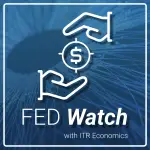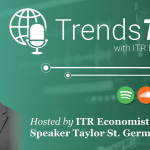WEEKLY FED WATCH
This week on Fed Watch, ITR Economics Consulting Principal and Chief Economist Brian Beaulieu provides an update on the economy, focusing on key indicators such as housing, existing home sales, and automobile production. Because of a disconnect between the Federal Reserve’s actions and market reactions, should you be focusing on market-based interest rates or the Federal Funds Rate when assessing interest rate sensitivity? Tune in to learn more!
Key Episode Takeaways
- 0:10 – Overview of current economic indicators
- 1:03 – Expectations for Federal Reserve actions
- 2:02 – Disconnect between Federal Reserve actions and market reactions
- 3:38 – Market-based interest rates vs. the Fed Funds Rate when assessing interest rate sensitivity
- 4:29 – No Fed Watch next week for Thanksgiving. We return the following week!
The below transcript is a literal translation of the podcast audio that has been machine generated by Notta.
Hello, I’m Brian Beaulieu, and thank you for joining us for this edition of FedWatch. Today is November 22nd, 2024. And overall on the economic side of things, we’re getting the tea leaves, the indicators from housing to existing home sales to automobile production are all telling us what we thought would be going on. We’re in this, still in this flat period, we’ve seen some improvement on the automobile side of things, housing permits, you know, they’re within norms, but they’re still soft, which is what we expected. They’ll all get better in the second half of 2025, a year from now, you’re going to see that existing home sales, building permits, et cetera, are getting better. But right now, those things are still soft. We don’t see any signs of immediate danger for the economy. So it’s not like the Federal Reserve is going to have to go into emergency mode or anything. Our own IT, our financial leading indicator, has risen for each of the last three months. And the overall trend within our leading indicator there is telling us that there’s no big emergency or looming pitfall that we have to worry about, all of which says that I expect the Federal Reserve and most people do, I suppose, that there’s some more interest rate decline. Is it going to come in December? I don’t know. Don’t really care. Wall Street says there’s a 55% probability that they’re going to lower interest rates another 25 bips in December. Actually, it’s 56% probability, 44% say, no, not going down. That’s the way the future’s market is read right now. It doesn’t matter, as we’ve said before, whether it’s December, January, February, I don’t think that they’re done. And one of the perverse reasons why I don’t think they’re done is because the marketplace isn’t bending to their will. We have not seen 30-year or 10-year government, for instance, decline with these declines in the Fed funds, in fact, since the election at best, the 10-year bond yield has remained stubbornly high. It’s actually inched just a little bit. And the 30-year fixed rate mortgage, instead of declining, is now at its highest level since July 11th, approximately. It’s not following the Fed’s lead at all. And while that may sound strange, it’s actually… The Fed is supposed to be watching the bond market. The bond market doesn’t usually react to the Federal Reserve. The bond market is looking down the road and they’re saying, “oh, there’s going to be more inflation 15, 18 months down the road,” consistent with what we’ve been talking about. So there’s a time limit on how long the Fed’s likely going to be pushing on this string trying to lower interest rates. There’s no great economic pain. We don’t think that there’s a whole lot of economic gain either. The Fed’s going to do their thing, but the marketplace is saying, no, this is about as good as it’s going to get in terms of these market-based interest rates. You can hold off another six months and maybe we’ll be able to catch a break, but it’s not going to be a big change. That’s why in our financial resiliency modeling that we do for individual businesses, we don’t model you to the Fed funds rate. It’s not where the action is at. We are always comparing you to the mortgage rate and to the 10-year federal government rate. Those are the best market rates we have when we’re trying to figure out if somebody is interest rate sensitive. So try and remove yourself one step from caring so much about the Fed and start looking a little bit more on these market interest rates. They’re probably the ones, if you are interest rate sensitive, the ones that you need to keep an eye on. Just a heads up, next week is Thanksgiving. So there will not be a Fed watch the Friday after Thanksgiving. I’m going to be with the children and grandchildren and we’re going to be out having a great time. I’m going to be meeting them up in New Hampshire and thoroughly looking forward to it. So we will be seeing you in two weeks. And that’s also peace. Take care of yourselves. We will talk to you later. Thank you.


